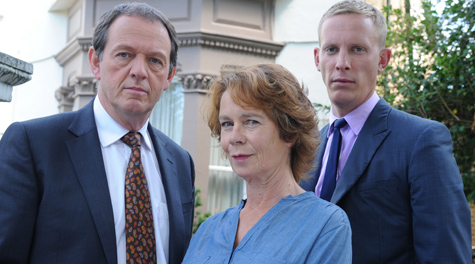 The spires are dreaming. The morning is misty. A woman in a flowing white kimono robe walks through a flower garden like a Pre-Raphaelite painting come to life.
The spires are dreaming. The morning is misty. A woman in a flowing white kimono robe walks through a flower garden like a Pre-Raphaelite painting come to life.
Two exotically dressed young people are punting on the river. A man drugs his wife’s morning coffee. A group of volunteer gardeners dig up a corpse . . . and we’re not even through the opening credits.
This can only mean one thing: we’re back in Oxford with Inspector Lewis.
“The Soul of Genius,” written by Rachel Bennette, is the first of four new Inspector Lewis episodes airing on Masterpiece Mystery. Its overall theme is the impossible quest, the eternal search for . . . something. We’re not sure what it is. We’re not sure if we’ll know it when we find it. We’re not sure what will happen if we do. And we’re not sure the outcome will be a happy one.
This idea is revealed most clearly in references to The Hunting of the Snark: An Agony in Three Fits by Lewis Carroll. It might be a nonsense poem. It might be an allegory. It might contain some sort of riddle or coded message. It is, as the academic Murray Hawes wrote in his journal, “a poem over which a sensitive soul might go mad.”
Of course we won’t have the chance to ask Murray Hawes what he meant by that statement because Murray Hawes is the dead man the gardeners dug up. Before he was killed, he had spent a huge amount of money to acquire an original manuscript of The Hunting of the Snark with Lewis Carroll’s notations on it—much more money than a career academic could be expected to have on hand. How he came into the cash is one of the questions Inspector Lewis and Sergeant Hathaway must answer.
The impossible quest is also reflected in The Doctrine of Signatures, a sixteenth-century botanical theory that attempted to link the shapes of particular plants to their healing properties. (Plants with flowers that resembled teeth were thought to cure toothache, and so on.) For the most part, the theory has been discredited, but that doesn’t stop people from trying to prove it even now.
Hathaway knows all about The Hunting of the Snark and The Doctrine of Signatures. “And he speaks Latin,” gushes Liv Nash, who’s planting a “Doctrine of Signatures” garden at the Oxford Botanic Garden. Hathaway even has the audacity to correct the dead man’s brother, the Reverend Doctor Conor Hawes, when he attempts to dazzle the cops with a casual mention of the Cyreniac philosophy of Aristippus. (Look it up; I did.) Yet Hathaway also misses a painfully obvious reference to Pulp Fiction when he first encounters it. Those of us unfamiliar with the works of Paracelsus and of Baudelaire (who also turns up in this episode), but who know the works of Tarantino might feel momentarily superior.
Lewis, as usual, leaves the intellectual gymnastics to Hathaway and focuses instead on the human element of the story. In this case, that’s Michelle Marber (played by Celia Imrie), a self-styled Miss Marple, crank, “serial cop-botherer” as Lewis’s boss Superintendent Jean Innocent puts it, who’s rooting around for clues to explain the death of her son several years earlier. The coroner called it an overdose; she believes different.
No one eats. Almost no one sleeps. Lots of people smoke. All roads seem to lead to the risky clinical drug trials run by Dr. Alex Falconer (played by James Fleet whom you’ve seen in everything from Little Dorrit to The Vicar of Dibley). And, this being Oxford, we’re also confronted with the usual quota of geniuses, or those who believe they are.

“All these lonely people pouring their lives into puzzles that can’t be solved,” tuts Sergeant Hathaway, nursing a pint outside a pub in the late afternoon. He’s talking about the cast of characters/suspects he and Lewis encounter this week. Yet, as Lewis well knows, Hathaway might as well be talking about himself.
Mozart said, “Love, love, love is the soul of genius.” It’s the source of the episode’s title and it’s certainly what drives everyone in the story—maybe even, this time, for an instant, Sergeant Hathaway.
Leslie Gilbert Elman is the author of Weird But True: 200 Astounding, Outrageous, and Totally Off the Wall Facts. Follow her on Twitter @leslieelman.
Read all of Leslie Gilbert Elman’s posts for Criminal Element.

As is my wont with reviews of things I want to see or read, I read this review after I saw the show. Thanks, Leslie, for it. It brought back the pleasures of watching the show. I love the series, as I did the Morse episodes that were the daddy of these. When I watch this one again on Netflix, which I am sure to do, I will have your insights to help me see even more in it.
Thank you Annamaria!
I love Morse too, and I think it’s time for my local PBS station to rerun the series–especially since Endeavour was such a hit.
I am running about a week behind in my tv watching. (Long live DVRs.) So I’ve only just read this post. You have really hit the primary “thing” about this series. I’m drawn back time and again by the personalities of Lewis and Hathaway, which are so understated but always revealed by a word or an action. I did love Hathaway ‘s slight flirtation with the garden girl. Most touching was Lewis consoling Mrs. Marber about her dead son, and talking about his dead wife. Of couse now I can’t read your post about the “Viper” episode until I watch it. See you then.
There’s no rush Terrie. Make ’em last!
Catch the reference to Paracelsus in the closing credits?
You bet I did! 🙂